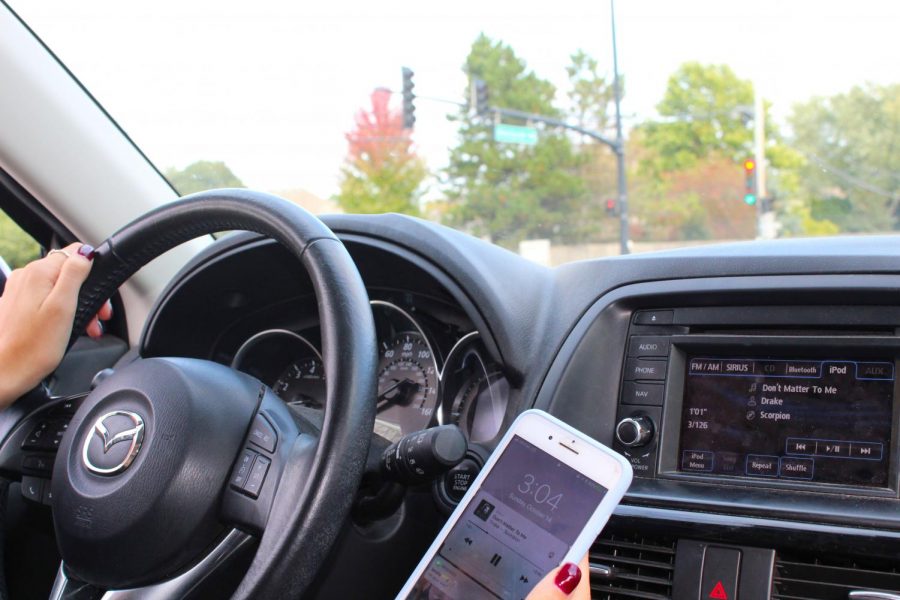Distracted Driving: How Dangerous is Losing Focus?
Teenagers will often drive with their phones in hand which increases the risk of crashing because of visual and auditory inattention.
You are driving in your car and pick up your phone to change the song or check the navigation or see if your mom finally texted you back.
This simple act of taking your eyes off the road makes you 1.4 times more likely to crash your car, according to the Virginia Tech Transportation Institute. If while picking up your phone you decide to send a text, that is six times more dangerous than driving while intoxicated, according to the National Highway Traffic Safety Administration.
Factually, distracted driving is a dangerous act that claims several lives a day, and though many students are aware of the dangers, it is often ignored for a glance at a notification or engagement with friends in the back seat.
What is it?
Distracted driving is when the driver’s attention is averted from watching the road and controlling the vehicle. This can be anything from texting or talking on the phone, eating and drinking, listening to music loudly or being preoccupied with other passengers in the car. From a survey completed by 203 LHS students with their driver’s licenses, many students admitted to doing most of these activities while behind the wheel.
All students must complete a driver’s education course— whether that be from the school class or an outside program— before getting their license, which means most students are either currently enrolled or have completed the course. In driver’s ed classes at LHS, part of the curriculum is teaching new drivers about the risks of distracted driving and prevention.
“We focus on cognitive, biomechanical, visual and auditory forms of driver distraction,” explained the drivers education teachers —Mr. Alex Adams, Mr. Sean Matthews, Mr. Brent Mork, Mr. Ron Russ, Mr. Adam Stuart and Brent Wilcox—in a typed response to interview questions. “Additionally, a number of our simulation lab films cover various topics that compete for driver attention on a regular basis. This lab environment allows students the opportunity to encounter challenging scenarios without placing themselves in harm’s way.”
Although all students learn information like this, many are not alarmed with the dangers of not having their full focus on the road. In our survey, 54 percent of students said they don’t feel unsafe or guilty while taking their attention away from the road, while the other 46 percent of students admitted to feeling uneasy doing so.
Senior Ellie Seyl, one student who admits to being a distracted driver, explained that she feels more scared than guilty: “I’m more terrified that I’m going to hit somebody…If it comes really close, I’m like, ‘Oh shoot, maybe I should focus.’ But it’s never like guilt, more like fear.” She later expressed that the only times she will feel guilty about driving recklessly is if she gets in a car accident, which has happened to her in the past.
What are the consequences?
Every day, 1,000 people are injured in car crashes that are reportedly due to a driver that took their attention off of the road; those crashes result in nine casualties a day, according to the Centers for Disease Control and Prevention.
Aside from fatalities, being preoccupied while driving is against the law: consequences such as tickets and fines can be issued from the police if someone were to be pulled over.
The state of Illinois prohibits the use of cell phones while operating a vehicle; however, hands-free devices or Bluetooth are allowed for drivers ages 19 or older.
Dusan Racic, the school resource officer, recalled what he would do if he witnessed someone who seemed to be looking down at their phone behind the wheel: “It can constitute as reasonable suspicion. I’d probably want to gather more information: I would probably want to follow that person so if they are still doing that, looking down, now their driving has become erratic…Then I have them looking down, then I have other factors, now I have probable cause that [they] are committing a violation.”
If caught, the first fine is $75 with a $25 increase with each ticket. In Illinois for people over the age of 21, three moving offense tickets will result in a suspension of driving privileges. Currently, the law says the first ticket is not considered a moving violation, however, starting in July 2019, it will be, which counts towards a potential driving suspension.
Another part of distracted driving is using a phone while stopped at a red light. The law states that in order to go on your phone at a red light, your car must be in neutral or park. Forty percent of students said they don’t do this, while 60 percent admitted they do.
Though it is harder for a police officer to pull someone over for distracted driving that is outside of phone usage, Officer Racic believes that natural consequences will occur: “If you are stuffing your mouth eating and trying to do your makeup at the same time and your vehicle is moving erratically during that time and you cause an accident, putting all those factors together, you could be charged with reckless driving, or heaven forbid someone gets hurt, reckless homicide.”
Several groups, including the police department and educators, are continually stressing preventative measures that drivers can take to lower the risk of a crash.
“Students must find ways to limit distraction and temptation,” the driver’s education teachers said.
They provided several tips on how to avoid driving distractedly: students can turn off their phones or place them away from arm’s reach; if someone must respond to a message, they should pull onto the side of the road to answer; minimize the number of occupants in the car; and “plan routes in advance when driving to unfamiliar areas and limit or minimize times of driving in stressful situations or busy traffic.”









